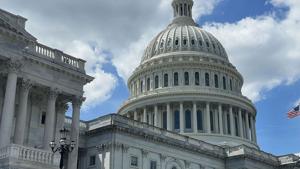
S&P keeps U.S. outlook stable, but says federal finances won’t improve
A top credit-rating agency decided to keep its outlook for U.S. credit stable, but said the federal government’s financial position “won’t meaningfully improve” in the coming years.
S&P Global Ratings said spending is expected to outpace revenue, with Congress continuing a multi-decade practice of deficit spending despite warnings from within the government that the U.S. remains on an unsustainable fiscal path.
Congress is expected to continue with annual deficits, S&P noted.
“We don’t expect the deficit to decline to the Treasury’s stated goal of a 3% deficit over time,” analysts wrote. “To date, in our view, broad, bipartisan support on proactive measures to meaningfully lower high fiscal deficits and curtail the rise in government debt remains elusive, and this affects creditworthiness.”
Late Monday, S&P Global Ratings affirmed its ‘AA+’ long-term and ‘A-1+’ short-term ratings on the U.S. In May, the U.S. federal government lost its final ‘AAA’ rating after Moody’s knocked down the U.S. credit rating to AA1, projecting Congress won’t be able to reduce the nation’s growing debt. Moody’s was the last credit-rating agency to keep the U.S. at a top AAA rating. Fitch Ratings downgraded the U.S. in 2023 and S&P Global Ratings did so 2011.
Republicans control all the levers of the federal government, holding narrow majorities in the House and Senate. For decades, the party has called for reducing federal spending, but has struggled to do so in the six months since President Donald Trump returned to the White House.
Sheila Weinberg, founder and CEO of Truth in Accounting, said the S&P report was designed for bondholders.
“While S&P’s reaffirmation of the U.S. credit rating at AA+ may comfort bondholders, it tells only part of the story. Credit ratings assess the government’s ability to repay debt to investors but they do not measure the government’s overall financial condition,” she told The Center Square. “The U.S. national debt is officially around $37 trillion, but that number does not include over $100 trillion in promised Social Security and Medicare benefits. These obligations are real – and growing – but the government has no concrete plan to pay for them.
She added: “S&P’s analysis may suggest that the U.S. can meet its bond payments in the near term, but that shouldn’t be confused with fiscal health. Ignoring $100 trillion in unfunded obligations paints a dangerously incomplete picture.”
Trump said his Department of Government Efficiency would be the government cost-cutting equivalent of the “Manhattan Project.” Trump’s DOGE initially aimed to cut $2 trillion from the federal budget. Former DOGE boss Elon Musk later cut that estimate in half. At a Cabinet meeting in April, Musk said the group was on pace to cut $150 billion from the federal budget.
Congress passed a massive tax cut and spending bill earlier this year, expected to add $4.1 trillion to the national debt by 2034, mostly from the permanent extension of key tax provisions in the 2017 Tax Cuts and Jobs Act.
Trump’s tariff revenue will help offset some of the costs, S&P Global said.
“Amid the rise in effective tariff rates, we expect meaningful tariff revenue. At this time, it appears that meaningful tariff revenue has the potential to offset the deficit-raising aspects of the recent budget legislation,” analysts for S&P Global wrote. “We do not think that legislation, in itself, will reduce the deficit. It contains some significant spending cuts, namely on Medicaid, but also raises spending elsewhere, notably for defense and border security.”
Congress has run a deficit every year since 2001.
Carolyn Bourdeaux, executive director of Concord Action, said Congress should establish a debt commission to address the broader issues.
“While S&P noted that tariffs are boosting revenue in the short term, our structural deficit still continues to grow, making our fiscal situation increasingly precarious,” she told The Center Square. “We need serious action by the President and Congress to bring the federal budget under control. As a first step, Concord Action would like to see Congress implement a debt reduction commission this fall, along with expedited legislative procedures to reduce our deficits. Additionally, Members of Congress should pledge not to pass any new legislation that adds to the debt. If it’s worth doing, it’s worth paying for.”
Latest News Stories

Everyday Economics: Rate cut debate: Reading mixed signals in a fragile economy

Arizona looks to legal immigration with Trump’s border security

Ranchers decry beef imports from Argentina, expert says good start

Mokena Park District Increases Spending Authority to Align with New State Law

Mokena Police Department Welcomes First K-9 Officer, Kong

Mokena Approves ‘Emerald Social’ Restaurant and Outdoor Entertainment Venue

Lawmakers introduce bills to slash their own pay during government shutdowns

Trump considers military action to stop Christian genocide in Nigeria

94% of sanctioned scholars suffered from free speech attacks

Illinois soybean farmers face uncertainty amid MAHA push against seed oils

Family-based visa quotas cause system backlogs

Crete Township ‘Tiny Home’ Owner Appeals Permit Denial


